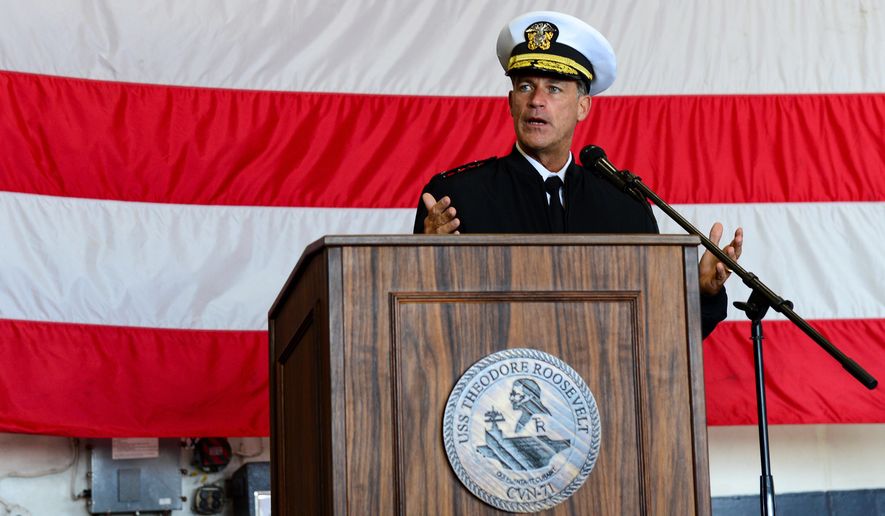Beijing’s aggressive moves in the South China Sea and elsewhere have sparked a “sense of urgency” inside the Pentagon, the U.S. military’s top Pacific commander said Wednesday, pledging that America and its allies will work together to push back on China’s quest for global dominance.
Speaking at this year’s virtual Aspen Security Forum, Adm. John C. Aquilino, the head of U.S. Indo-Pacific Command, said the U.S. strategy of “integrated deterrence” toward China is crucial to maintaining peace, prosperity and stability across Asia. That approach, which seeks to link U.S. military capabilities across all domains in a grand deterrent strategy, is a key piece of the Pentagon’s latest budget plan and helps define America’s broader strategy for the Pacific.
A host of recent Chinese provocations, Adm. Aquilino said, underscore the need for that deterrence, including Beijing’s harsh crackdown on protesters in Hong Kong, its recent border skirmish with neighbor India, and its repression of minority Uyghurs in China’s Xinjiang province that the U.S. has labeled a “genocide.” He also cited indications that China could be accelerating its timeline to retake control of Taiwan and its vast territorial claims in the South China Sea as examples of why U.S. forces need to accelerate preparations for potential conflict in the Pacific.
“We view those actions with concern. We view with concern the unlawful claim to the entire South China Sea, directly and negatively impacting all of the countries in the region,” Adm. Aquilino said. “Those are the things that lead me to believe that our execution of integrated deterrence has to occur now — and with a sense of urgency.”
From his post at Indo-Pacific Command, Adm. Aquilino now plays a leading role in so-called “freedom of navigation” operations in the South China Sea, a strategically vital waterway that handles an estimated 25% of all global trade. China claims much of the sea as its own sovereign territory, leading U.S. and allied warships to routinely sail through the area in a symbolic rejection of those claims.
On Wednesday, India, which has increasingly aligned with U.S. allies in the region to contain Chinese ambitions, deployed its own warships to the South China Sea.
Even some European nations have joined in the effort. For the first time in two decades, Germany this week reportedly dispatched a warship to the South China Sea. That mission is important, analysts say, as it underscores how China’s global ambitions are setting off alarm bells in Europe.
“If there was ever a real conflict breaking out in this part of the world, affecting freedom of navigation, the lights would probably go out overnight” across parts of Europe, Wolfgang Ischinger, chairman of the Munich Security Conference and former German ambassador to the U.S., told the Aspen forum on Wednesday. “It actually matters because our economic interests, our political interests … will be enormously affected” by what happens in the South China Sea.
From the U.S. military perspective, however, there are also reasons for strategic concern. Late last month, for example, Vice Chairman of the Joint Chiefs Gen. John Hyten revealed that the U.S. side had “failed miserably” in a war game simulation of a Chinese attempt to overrun Taiwan.
“An aggressive red team that had been studying the United States for the last 20 years just ran rings around us. They knew exactly what we’re going to do before we did it,” he told an audience at a defense industry event July 26.
The Defense Department has revealed few details about that specific war game, but officials said it delivered a jolt to the military’s joint war fighting efforts in the Pacific. Adm. Aquilino downplayed the startling results of such exercises.
“We have an understanding of what war games are designed to do for us,” he said. “Those exercises and events, first of all, are designed to learn. Our intent is to challenge ourselves against the absolute most difficult problem.”
“Those games have helped us to identify where we have gaps and seams, how we make requests for capabilities and requirements to ensure our competitive advantage is maintained, that we’re not fighting the last war,” Adm. Aquilino said. “I’m confident we still have the finest and strongest military on the earth and that the U.S. is ready for any contingency, should it occur.”
• Ben Wolfgang can be reached at bwolfgang@washingtontimes.com.




Please read our comment policy before commenting.